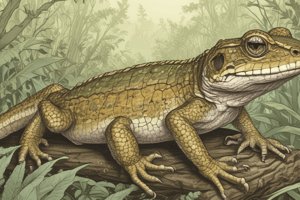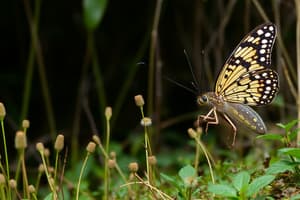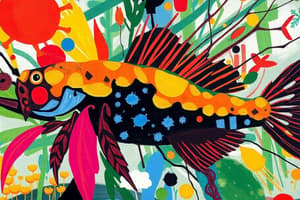Podcast
Questions and Answers
What are invasive species and how do they harm the local ecosystem?
What are invasive species and how do they harm the local ecosystem?
Invasive species are non-native species that harm the local ecosystem by harming its animals, plants, soil, or people. They can disrupt the balance of the ecosystem by outcompeting native species for resources and causing extinction or decreased diversity.
What are some ways invasive species are introduced to new areas?
What are some ways invasive species are introduced to new areas?
Invasive species are often introduced to new areas through smuggling or being released as pets.
Why can invasive species become pests in an ecosystem?
Why can invasive species become pests in an ecosystem?
Invasive species can become pests because they may not have predators in the ecosystem. Without predators to control their population, they can quickly multiply and outcompete native species for resources.
How do ordinary ecosystems maintain balance?
How do ordinary ecosystems maintain balance?
Why are less diverse ecosystems more susceptible to diseases and natural disasters?
Why are less diverse ecosystems more susceptible to diseases and natural disasters?
Flashcards are hidden until you start studying
Study Notes
Invasive Species
- Invasive species are non-native organisms that cause harm to the local ecosystem, economy, or human health.
- They can outcompete native species for resources, alter habitats, and disrupt the food chain.
Introduction of Invasive Species
- Human activities such as travel, trade, and recreation can introduce invasive species to new areas.
- Examples of introductions include:
- Unintentional transport through cargo, luggage, or vehicles
- Intentional releases of non-native species for food, pets, or recreation
- Escapes from captivity, gardens, or aquariums
Invasive Species as Pests
- Invasive species can become pests due to their high reproductive rate, adaptability, and lack of natural predators.
- They can alter ecosystem processes, reduce biodiversity, and cause economic losses.
Ecosystem Balance
- Ordinary ecosystems maintain balance through:
- Competition for resources among native species
- Predation and grazing by native species
- Natural disturbances and succession
Susceptibility to Diseases and Disasters
- Less diverse ecosystems are more susceptible to diseases and natural disasters due to:
- Reduced resilience and adaptability
- Increased vulnerability to invasive species and pathogens
- Lack of functional redundancy and ecosystem services
Studying That Suits You
Use AI to generate personalized quizzes and flashcards to suit your learning preferences.




